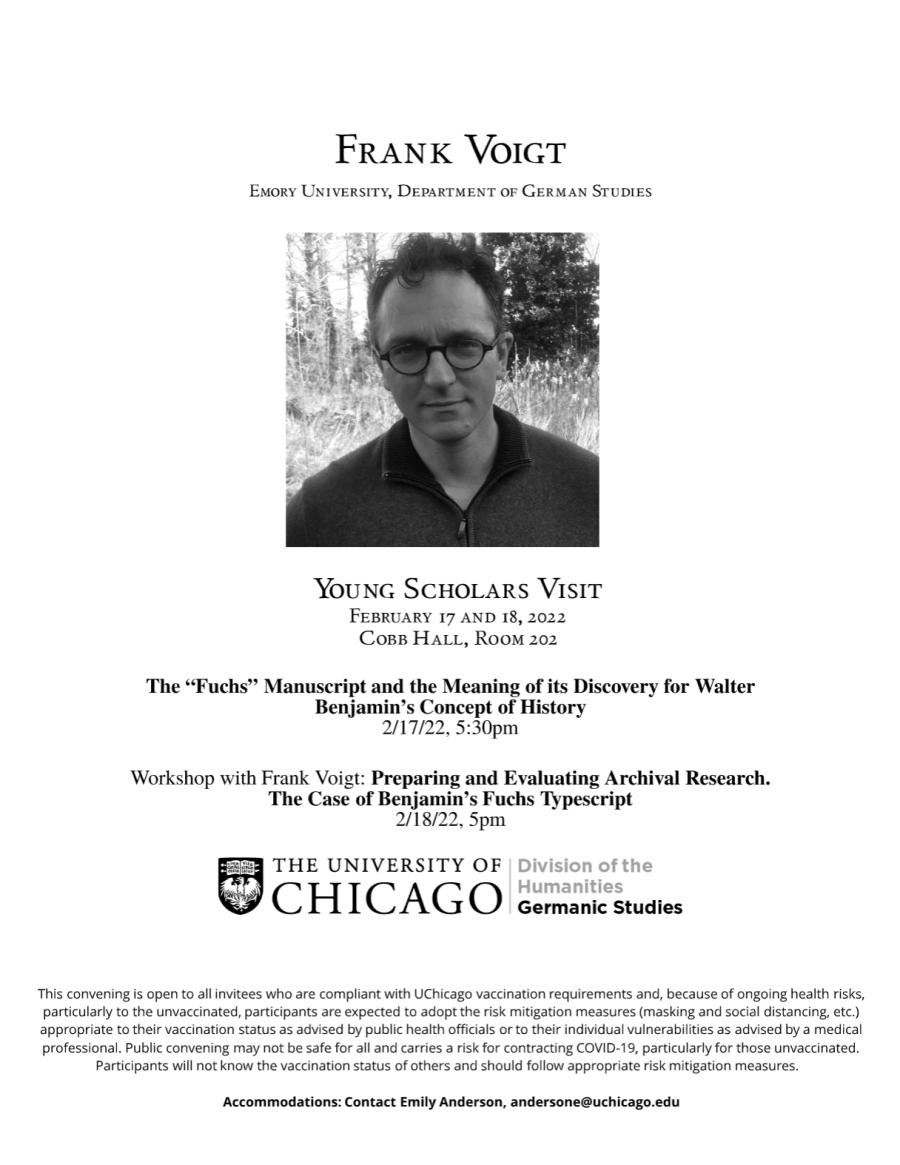Frank Voigt’s Young Scholar’s Visit
This “Young Scholar’s Visit” series presents two exciting talks from Frank Voigt, a DAAD lecturer at Emory University and Visiting Scholar at the Tam Institute for Jewish Studies.
The “Fuchs” Manuscript and the Meaning of its Discovery for Walter Benjamin’s Concept of History (2/17 5:30pm, Cobb 202)
Walter Benjamin’s 1937 essay on the art historian and collector Eduard Fuchs is considered to present the most forceful account of Benjamin’s materialist conception of the history of art—along with Benjamin’s last work, the famous “Theses” On the Concept of History. Whereas the latter is at the center of the Benjaminian canon and has influenced discourse in various disciplines, the former, the essay “Eduard Fuchs: Collector and Historian,” has been received merely as laying the groundwork for the “Theses.” Since the manuscript of the Fuchs essay had been considered to be lost, its publication in the Zeitschrift für Sozialforschung became the basis for all later editions. Benjamin’s correspondence with the editors Max Horkheimer and Leo Löwenthal shows that Benjamin had to consent to cuts and changes in the process of its publication. However, I was able to discover the original manuscript of Benjamin’s essay, the contents of which was quite astonishing. In my talk, I will assess the manuscript and the underlying controversies between Max Horkheimer, Leo Löwenthal and Benjamin. I argue that the Fuchs essay and the “Theses” do not belong to a single methodology of how to ‘brush history against the grain,’ but represent rather two very different approaches.
Workshop with Frank Voigt, Topic: Preparing and Evaluating Archival Research. The Case of Benjamin’s Fuchs Typescript (2/18 5pm, Cobb 202)
On a hunt for a lost document or digging for all kinds of information to develop understanding, formulate questions and get inspiration? Archival work matters. The structure of this workshop is twofold. First, I will share some thoughts on how to prepare and evaluate archival work and how to integrate your findings in a research project. I will do this using the typescript of Benjamin’s essay on Eduard Fuchs as an example. Second, we will discuss the typescript and some of its new passages together, comparing it to the printed version. No previous knowledge is necessary. But if you would like to prepare, feel free to read the essay “Eduard Fuchs, der Sammler und der Historiker” in the edition of the Gesammelte Schriften or Selected Writings.
Frank Voigt is DAAD-Lecturer at the Department of German Studies at Emory University and Visiting Scholar at the Tam Institute for Jewish Studies. Frank is interested in the history of students in Germany, the difficult process of the emancipation of Jews in Germany in the 19th and 20th century and analyses of crisis in Weimar Republic. This interest has led him to the area of intellectual history, in which he explores conceptions and agency of writers and their work in relation to the democratization of society as a whole. He is currently finishing his book on transformations in the interrelationships between concepts of literary criticism and history in reviews and essays by Walter Benjamin. Voigt has co-edited Nachkriegsliteratur als öffentliche Erinnerung. Deutsche Vergangenheit im europäischen Kontext (De Gruyter, 2018) and Material und Begriff. Arbeitsverfahren und theoretische Beziehungen Walter Benjamins (Argument-Verlag, 2019).
Frank Voigt, Young Scholar's Visit
Feb 17, 2022 | 5:30PM
Cobb 202

